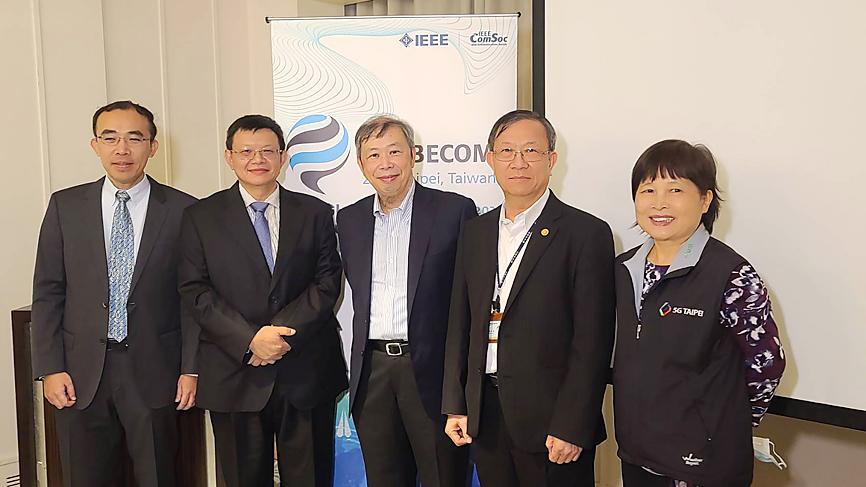The Institute of Electrical and Electronic Engineers (IEEE) Global Communications Conference (GLOBECOM) began at the Taipei International Convention Center yesterday with the theme “Communications for Human and Machine Intelligence,” as many of the 73 participating companies focused on 5G, artificial intelligence, big data, edge computing, the Internet of Things and e-medicine.
The four-day GLOBECOM is the flagship event of the IEEE, the largest professional electronics association in the world, and this year’s chairman, Chunghwa Telecom Co (中華電信) chief executive of mobile services Tu Yuan-kuang (涂元光), marked the significance of the occasion at a news conference in Taipei on Monday.
“The holding of GLOBECOM 2020 in Taipei is important for Taiwan,” Tu said. “It’s time to shake off the ‘contract manufacturer’ label with cutting-edge research.”

Photo: CNA
“The ability for 5G technology to dramatically increase the amount of data we can transfer will open up brand new possibilities for applications,” Department of Industrial Technology Director-General Chiou Chyou-huey (邱求慧) said at the conference yesterday.
By working with the industry and nonprofit organizations, the department has developed more than 650 potential applications, some of which are being showcased at the department’s booth at the conference, Chiou said.
One application is a remote monitoring system conveying real-time data from a factory to off-site professionals, he said.
“The workers on the floor might not be able to tell anything is wrong, but off-site engineers can immediately detect problems,” Chiou said. “This would not have been possible using 4G because of the volume of data and the time lag.”
Hon Hai Precision Industry Co (鴻海精密) is participating at GLOBECOM for the first time, presenting a live demonstration of its 5G open radio access network solutions, with low latency and download speeds of 1 gigabyte per second.
Cisco Systems Inc is showcasing its collaboration with Japan’s Rakuten Inc to deliver the world’s first 5G cloud-native mobile network.
The US company’s experience with Rakuten would provide Taiwanese telecoms with a “strong reference” for accomplishing something similar, Cisco said.
Cisco greater China managing director and Taiwan general manager George Chen (陳志惟) said in a press release that the company is partnering with the government and industry in Taiwan to “create more possibilities” for 5G technology.
The decision to hold this year’s GLOBECOM in Taipei was made before the COVID-19 pandemic. The previous event to be held in Taipei had been in 2002.
While the nation’s successful COVID-19 prevention efforts meant that the event was able to go ahead, not all of the participants could attend and for the first time GLOBECOM this year is an online-offline event.
“Taiwan has attracted the attention of the world for our successful handling of the COVID-19 pandemic, but what is more important is seizing upon the technical advancements and opportunities afforded by the crisis,” Chiou said. “If we can develop more 5G applications, it shows that Taiwan can help, and not just when it comes to virus prevention.”
GLOBECOM continues until Friday, while access to the virtual platform is available until the end of the year.

When an apartment comes up for rent in Germany’s big cities, hundreds of prospective tenants often queue down the street to view it, but the acute shortage of affordable housing is getting scant attention ahead of today’s snap general election. “Housing is one of the main problems for people, but nobody talks about it, nobody takes it seriously,” said Andreas Ibel, president of Build Europe, an association representing housing developers. Migration and the sluggish economy top the list of voters’ concerns, but analysts say housing policy fails to break through as returns on investment take time to register, making the

EARLY TALKS: Measures under consideration include convincing allies to match US curbs, further restricting exports of AI chips or GPUs, and blocking Chinese investments US President Donald Trump’s administration is sketching out tougher versions of US semiconductor curbs and pressuring key allies to escalate their restrictions on China’s chip industry, an early indication the new US president plans to expand efforts that began under former US president Joe Biden to limit Beijing’s technological prowess. Trump officials recently met with their Japanese and Dutch counterparts about restricting Tokyo Electron Ltd and ASML Holding NV engineers from maintaining semiconductor gear in China, people familiar with the matter said. The aim, which was also a priority for Biden, is to see key allies match China curbs the US

NOT TO WORRY: Some people are concerned funds might continue moving out of the country, but the central bank said financial account outflows are not unusual in Taiwan Taiwan’s outbound investments hit a new high last year due to investments made by contract chipmaker Taiwan Semiconductor Manufacturing Co (TSMC, 台積電) and other major manufacturers to boost global expansion, the central bank said on Thursday. The net increase in outbound investments last year reached a record US$21.05 billion, while the net increase in outbound investments by Taiwanese residents reached a record US$31.98 billion, central bank data showed. Chen Fei-wen (陳斐紋), deputy director of the central bank’s Department of Economic Research, said the increase was largely due to TSMC’s efforts to expand production in the US and Japan. Investments by Vanguard International

STRUGGLING TO SURVIVE: The group is proposing a consortium of investors, with Tesla as the largest backer, and possibly a minority investment by Hon Hai Precision Nissan Motor Co shares jumped after the Financial Times reported that a high-level Japanese group has drawn up plans to seek investment from Elon Musk’s Tesla Inc to aid the struggling automaker. The group believes the electric vehicle (EV) maker is interested in acquiring Nissan’s plants in the US, the newspaper reported, citing people it did not identify. The proposal envisions a consortium of investors, with Tesla as the largest backer, but also includes the possibility of a minority investment by Hon Hai Precision Industry Co (鴻海精密) to prevent a full takeover by the Apple supplier, the report said. The group is